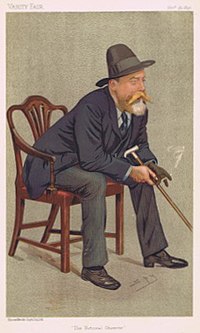Invictus
| "Invictus" | |
|---|---|

|
|
| Author | William Ernest Henley |
| Country | England |
| Language | English |
| Genre(s) | Lyric poetry |
| Publisher | Book of Verses |
| Media type | Print (periodical) |
| Publication date | 1888 |
"Invictus" is a short Victorian poem by the English poet William Ernest Henley (1849–1903). It was written in 1875 and published in 1888 — originally with no title — in his first volume of poems, Book of Verses, in the section Life and Death (Echoes).
Early printings contained a dedication To R. T. H. B.—a reference to Robert Thomas Hamilton Bruce (1846–1899), a successful Scottish flour merchant, baker, and literary patron. The title "Invictus" (Latin for "unconquered") was added by editor Arthur Quiller-Couch when the poem was included in The Oxford Book of English Verse. With the message of displaying fortitude in the face of adversity, the poem evokes Victorian stoicism and a "stiff upper lip".
Out of the night that covers me,
Black as the pit from pole to pole,
I thank whatever gods may be
For my unconquerable soul.
In the fell clutch of circumstance
I have not winced nor cried aloud.
Under the bludgeoning of chance
My head is bloody, but unbowed.
Beyond this place of wrath and tears
Looms but the Horror of the shade,
And yet the menace of the years
Finds, and shall find me, unafraid.
It matters not how strait the gate,
How charged with punishments the scroll,
I am the master of my fate:
I am the captain of my soul.
Henley's literary reputation rests almost entirely upon this single poem. In 1875 one of Henley's legs required amputation due to complications arising from tuberculosis. Immediately after the amputation he was told that his other leg would require a similar procedure. He chose instead to enlist the services of the distinguished English surgeon Joseph Lister, who was able to save Henley's remaining leg after multiple surgical interventions on the foot.
While recovering in the infirmary, he was moved to write the verses that became "Invictus". This period of his life, coupled with recollections of an impoverished childhood, were primary inspirations for the poem, and play a major role in its meaning. A memorable evocation of Victorian stoicism—the “stiff upper lip” self-discipline and fortitude in adversity, which popular culture rendered into a British character trait, "Invictus" remains a cultural touchstone.
...
Wikipedia
